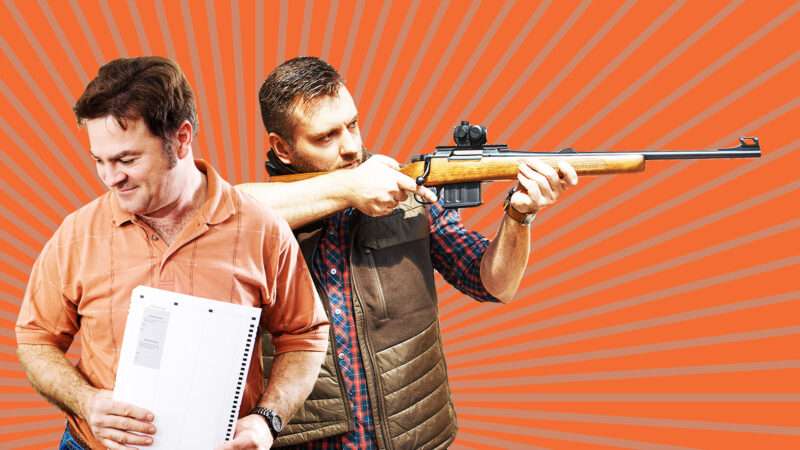
Sen. Alex Padilla (D–Calif.) recently claimed that it is easier in some states to acquire a rifle than it is to cast a ballot. This false claim ignores the reality of gun control in America. Despite widespread misconceptions held by gun control advocates, guns are the most heavily regulated consumer good in the country. Millions of Americans are federally prohibited from not only possessing a gun for even a fleeting moment, but also from possessing even a single bullet.
Everyone who purchases a gun from a gun dealer must undergo a background check. The background check system is fairly robust (even though false positives can be a problem), and it screens for a variety of conditions and offenses that would disqualify someone from legally possessing a gun. Ineligible individuals include, among others, felons, those who have been dishonorably discharged from the military, anyone who has been involuntarily committed or adjudicated as a “mental defective,” undocumented immigrants, and anyone who has been convicted of a misdemeanor crime of domestic violence. If a prohibited person acquires a gun through a private sale without a background check, he is committing a felony. If the seller knew or had “reasonable cause” to know that the recipient was a prohibited buyer, then he is committing a felony too. Violators can serve up to 10 years in prison.
While prohibiting some people from possessing a gun might make sense, millions more Americans are stripped of their Second Amendment rights if they are “unlawful users” of or addicted to any controlled substance. It’s no defense if you live in a state where marijuana has been legalized. And if you lie on the form and say you don’t use illicit drugs, that’s a five-year felony.
This is not all just theoretical, as Ethan Kollie found out. Kollie helped the 2019 Dayton nightclub shooter build his gun (but not to commit the shooting, of which Kollie had no inkling). When the feds came to Kollie, he admitted to using marijuana and to lying on the background check form. He will serve 32 months for lying on the form and being illegally in possession of firearms.
In general, however, you need not worry if you use marijuana and own guns—if you’re white and live in an affluent neighborhood, that is. Those charged with prohibited possession of a firearm are usually already under investigation or having trouble with the law in other ways. Federal prosecutors often charge every offense they can, as it gives them more leverage in plea deals and helps pad their conviction rate. In 2007, for example, federal prosecutors charged John Mooney with possession of a firearm by a felon after he took a gun from his ex-wife, who had held the weapon to his head. Mooney then walked seven blocks to the bar he worked at to give it to the police. For those seven blocks he was in possession of the firearm and technically violating the law. And in November, the U.S. Court of Appeals for the 8th Circuit upheld a sentence of 30 months for a felon who was convicted of possessing a single bullet.
These are just the federal restrictions. Many states have onerous requirements of their own, such as the 10 states that require a permit to purchase a firearm. In Washington, D.C., the requirements for legally owning a gun are sufficiently cumbersome that many have simply given up. While the pandemic came with gun-buying fervor across the country, in D.C., the only federal firearm licensee who could legally authorize the transfer or acquisition of guns abruptly stopped business. Gun rights, unlike voting rights, can be precarious enough that a change in profession can affect the right to self-defense for thousands of people.
True, not all firearms sales are run through the background check system. Private sales between individuals who are not in the business of selling guns are not subject to background checks. Fixing that “loophole” is the goal of so-called universal background check bills. Note, however, that anyone who is prohibited from possessing a weapon who acquires one through a private sale is already committing a significant felony, as is the seller if he knows the buyer is prohibited.
Obviously, registering to vote and casting a ballot are not subject to the same restrictions as purchasing a gun. In many states, felons are commonly restricted from voting during the period of incarceration, and in 11 states felons lose their voting rights indefinitely. But every felon in every state is federally prohibited from possessing a firearm or ammunition, and states are powerless to relax those restrictions. That’s true for someone who received a suspended sentence for tax fraud 30 years ago as well as for a murderer who served his time. (In rare instances, courts have restored Second Amendment rights to some felons—those with the resources to take their cases to court, at least. The blanket prohibition is the default rule.)
While some states may have overly bureaucratic systems for voter registration, that’s nothing compared to gun restrictions. Twenty-one states allow same day voter registration, and every state allows some sort of mail-in voting with just five states requiring a justification for voting by mail. Yes, lines may be long at some polling places, but the same is true of gun stores, especially last year.
Gun control advocates often embrace the narrative that guns are freely available in stores to anyone who wants one. Maybe they’ve never tried to buy a gun, and perhaps they don’t know any gun owners. In this and so many other ways, the gun debate is actually a culture debate. Guns are similar to voting in that people imbue them with deep significance and get fiercely riled up about restrictions. Within political tribes, your stance on gun rights or voting rights is a signaling device—but it’s still important to get your facts straight.
from Latest – Reason.com https://ift.tt/3d2cmDk
via IFTTT